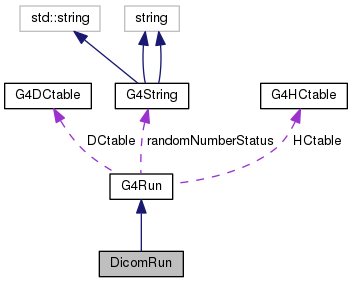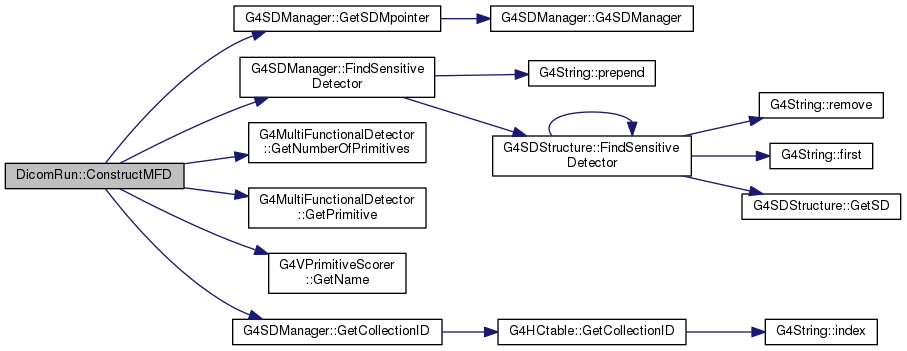|
Geant4
10.03.p03
|
|
Geant4
10.03.p03
|
#include <DicomRun.hh>


Additional Inherited Members | |
 Protected Attributes inherited from G4Run Protected Attributes inherited from G4Run | |
| G4int | runID |
| G4int | numberOfEvent |
| G4int | numberOfEventToBeProcessed |
| G4HCtable * | HCtable |
| G4DCtable * | DCtable |
| G4String | randomNumberStatus |
| std::vector< const G4Event * > * | eventVector |
DicomRun class
Example implementation for multi-functional-detector and primitive scorer. This DicomRun class has collections which accumulate a event information into a run information.
Definition at line 50 of file DicomRun.hh.
| DicomRun::DicomRun | ( | ) |
(Description) DicomRun Class is for accumulating scored quantities which is scored using G4MutiFunctionalDetector and G4VPrimitiveScorer. Accumulation is done using G4THitsMap object.
The constructor DicomRun(const std::vector<G4String> mfdName) needs a vector filled with MultiFunctionalDetector names which was assigned at instantiation of MultiFunctionalDetector(MFD). Then DicomRun constructor automatically scans primitive scorers in the MFD, and obtains collectionIDs of all collections associated to those primitive scorers. Futhermore, the G4THitsMap objects for accumulating during a RUN are automatically created too. (*) Collection Name is same as primitive scorer name.
The resultant information is kept inside DicomRun objects as data members. std::vector<G4String> fCollName; // Collection Name, std::vector<G4int> fCollID; // Collection ID, std::vector<G4THitsMap<G4double>*> fRunMap; // HitsMap for RUN.
The resualtant HitsMap objects are obtain using access method, GetHitsMap(..).
Definition at line 67 of file DicomRun.cc.
| DicomRun::DicomRun | ( | const std::vector< G4String > | mfdName | ) |
|
virtual |
Definition at line 84 of file DicomRun.cc.
Definition at line 100 of file DicomRun.cc.


|
inline |
| G4THitsMap< G4double > * DicomRun::GetHitsMap | ( | const G4String & | detName, |
| const G4String & | colName | ||
| ) | const |
Definition at line 210 of file DicomRun.cc.

| G4THitsMap< G4double > * DicomRun::GetHitsMap | ( | const G4String & | fullName | ) | const |
Definition at line 221 of file DicomRun.cc.

|
inline |
Definition at line 67 of file DicomRun.hh.
Reimplemented from G4Run.
Definition at line 188 of file DicomRun.cc.

Reimplemented from G4Run.
Definition at line 151 of file DicomRun.cc.
